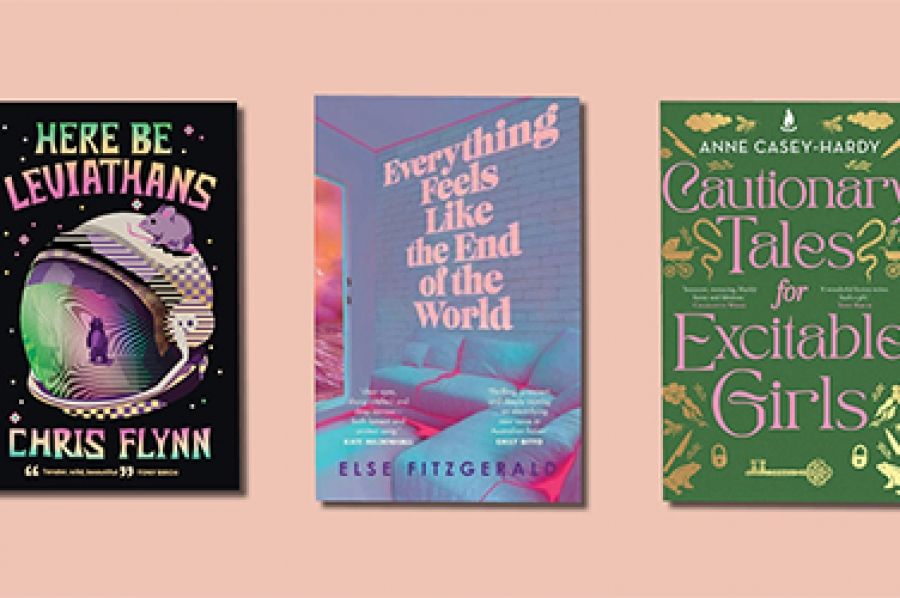
- Free Article: No
- Contents Category: Short Stories
- Custom Article Title: Three new short story collections by Chris Flynn, Else Fitzgerald, and Anne Casey-Hardy
- Review Article: Yes
- Article Title: Experimental flair
- Article Subtitle: Three new short story collections
- Online Only: No
- Custom Highlight Text:
There’s a theory that short fiction is the perfect panacea for modern life. As our attention spans grow weak on a diet of digital gruel and as our free time clogs up with late-night work emails, enter the short story as an efficient fiction-booster administered daily on the commute between suburb and CBD. I love this theory, and I will forever resent Jane Rawson for exposing its flaws in a 2018 Overland article on the subject. Rawson explains that most time-poor readers prefer to dip in and out of long novels, where they can greet familiar worlds without the awkward orientation period required by a new text. In contrast, says Rawson, collections of ‘stories plunge you back into that icy pool of not-knowing every 500, 800, 2000 or 5000 words. Who wants that? Pretty much no-one, if bestseller lists are anything to go by.’
- Featured Image (400px * 250px):
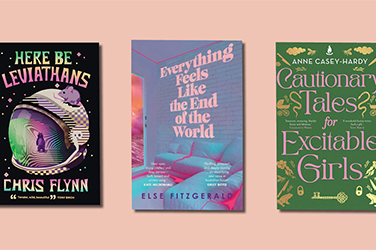
- Alt Tag (Featured Image): Three new short story collections by Chris Flynn, Else Fitzgerald, and Anne Casey-Hardy
The potential for communicating with non-humans is raised in the opening story, ‘Inheritance’, where a grizzly bear achieves rudimentary dialogue with his hunter and asks, ‘what wonders might our species achieve together if further discussion were possible?’ Flynn’s answer: dad jokes. ‘Our kind prefer not to employ the term “bearer of bad news”,’ says that same bear earlier in the story. ‘Diane and Hector’s marriage was wearing as thin as my carpet,’ quips the hotel room in ‘A Beautiful and Unexpected Turn’. And when the airplane seat in ‘22F’ complains about office politics, it worries most about colleagues ‘twisting a knife in your tray table’.
Flynn is a consistently amusing writer – Mammoth won the Russell Prize for Humour – but his search for laughs ends up blending too many of these disparate creatures into a single, unmistakably human voice. When Flynn does experiment with voice, the stories get a notable lift. See, for example, the unpunctuated rush of the rifle in ‘Shot Down in Flames’: ‘humans are simply tools you need one to get the job done they’re little more than a necessary inconvenience’. Or – trigger-warning here – the chilling arrogance of the virus spreading throughout the world in ‘Straits of Magellan’: ‘Once we know them all, there will be no wants, no needs, no fear.’
The latter story, which Flynn swears he wrote before the real pandemic, also stands out for containing a sense of danger for its characters. There is plenty of action elsewhere – crocodile attacks, crash landings, and deadly traps – but nothing a cheeky pun can’t fix. That’s not necessarily a bad thing: stories like ‘A Beautiful and Unexpected Turn’, with its nuanced exploration of polyamory, are welcome rays of positivity in 2022. But for all Flynn’s interspecies curiosity, his human heart proves difficult to hide.
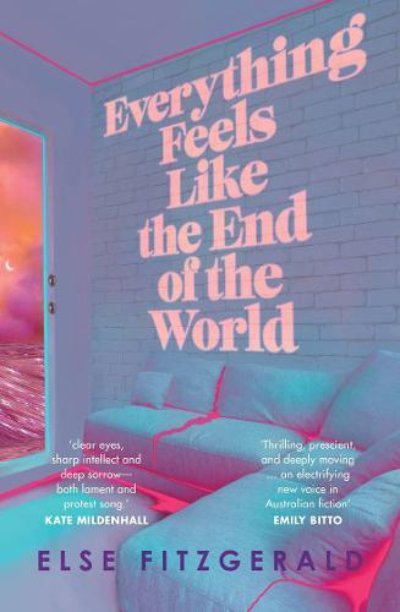 Everything Feels like the End of the World by Else Fitzgerald
Everything Feels like the End of the World by Else Fitzgerald
Allen & Unwin, $29.99 pb, 252 pp
There is no doubting the stakes in Else Fitzgerald’s début collection, Everything Feels Like the End of the World. Across thirty-seven stories, the collection traverses a scarily feasible arc of climate change apocalypse, beginning in the near present and ending thousands of years in the future. This approach of skipping across generations has been used effectively before in works about climate change, including Steven Amsterdam’s Things We Didn’t See Coming (2009) and James Bradley’s Clade (2015). But Fitzgerald’s attempt stands out because of the vast temporal span it tackles, and the sheer variety of epochs it stops at along the way. With many stories only a few paragraphs long, the structure’s effect is akin to watching humanity quickly dissolve via flipbook.
The collection is essentially divided in two, with the first half mostly focusing on young people struggling to find meaning against a backdrop of rampant bushfires, drastic water shortages, and violent civil unrest. There is a potent ache to these stories, powered by Fitzgerald’s ability to allude to global collapse through small, domestic details, such as an ‘hourglass shower timer’ or withering tomato plants ‘tied against the stakes like something crucified’. Her attempts to crowbar the imagery of climate change into unwieldly metaphors are less welcome – ‘My want sheared off into your mouth like those icebergs calving into the sea’ – but these early stories are otherwise perfect jewels of quiet devastation.
The collection changes halfway through after the story ‘How Dark the Nights’, a flash piece sketching an abandoned Melbourne ‘quiet with no more trams’. From there, the everyday details of the first half are replaced by science-fiction novums: virtual reality, solar shields, memory emulation, and human-animal hybrids. The heavy exposition required for these stories means they rub awkwardly against the earlier semi-realist fare and stories such as ‘Feed’ and ‘Final Broadcast’ are little more than plotless information dumps. In contrast, other stories, like ‘Fibians’, with its Asian-infused canal-city of Yarratown, offer glimpses of fascinating worlds that deserve to be explored in longer works.
These two distinct halves are linked by the theme of children, in particular the question of whether the human instinct to procreate remains ethical in the face of the climate crisis. In the early stories, characters debate whether it is cruel to have children when ‘there’s nothing here to leave them’, or if it is in fact a hopeful act of ‘defiance, not surrender’. This contemporary dilemma then shapes an entire society in the latter half’s most powerful future vision, ‘The Gift’, where the birth of a child requires the sacrifice of an older family member. When a character explains that law’s necessity via reference to the ‘Great Dying’ of a past civilisation, it’s hard not to turn back to the start of the book and pray that it all takes a different path.
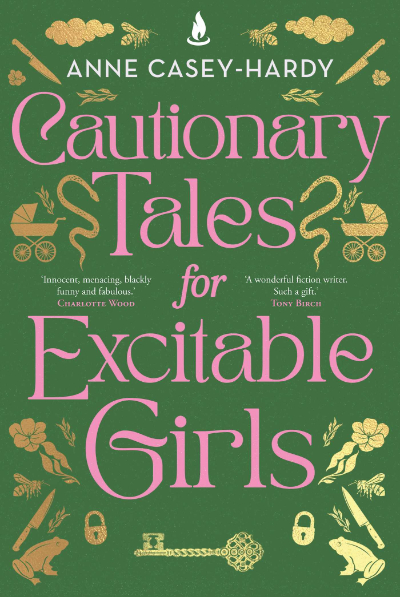 Cautionary Tales for Excitable Girls by Anne Casey-Hardy
Cautionary Tales for Excitable Girls by Anne Casey-Hardy
Scribner, $29.99 pb, 240 pp
Anne Casey-Hardy’s début collection, Cautionary Tales for Excitable Girls, also weaves together many of its otherwise diverse stories with the thread of children. In the Peter Carey Award-winning story, ‘Literally Beside Myself’, the borders of reality become hazy for a sleep-deprived mother, her nightmares of crumbling babies melding with Viking sex fantasies and ABC Kids. It feels as though Casey-Hardy wrote the collection in such a dream-like state herself, as she frequently melds the bizarre and the everyday in the manner of that great American surrealist, Joy Williams.
As the title suggests, Casey-Hardy’s narrators are exclusively female. Stories such as ‘New Years Eve’ and ‘The Wailey Willow’ are written from the vantage point of pre-teen girls, mining horror from an age in which the rich imagination of childhood fuses with the fever of onrushing puberty. Meanwhile, the worst horror of all – the loss of child – is explored obliquely in stories such as ‘I’ve Been Waiting So Long’, where a grieving nanny wanders a mansion straight out of The Turn of the Screw, hoping that ‘within this secretive house lies a chance for transformation’.
Readers might get a little lost themselves within these stories, where hidden themes are buried deep beneath layers of lush detail. For Casey-Hardy, every canyon is ‘shale pink and russet gold’, and every plant in sight deserves a mention: ‘Blurred sage green brush with straggling gum trees, she-oaks shrank into their spider-grey feathers.’ Occasionally, there is a hollowness at the core of this extravagant decoration, or a sense of being weird for weird’s sake. Mostly, however, stories like ‘Familia Sangre’ use their flurries of near-psychedelic description to show us the world through the tilted lens of grief. It is just the sort of perspective shift that makes a daily fiction-booster so important.


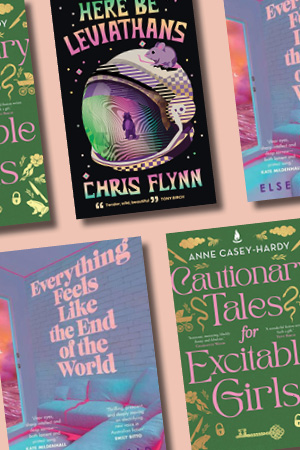
Comments powered by CComment